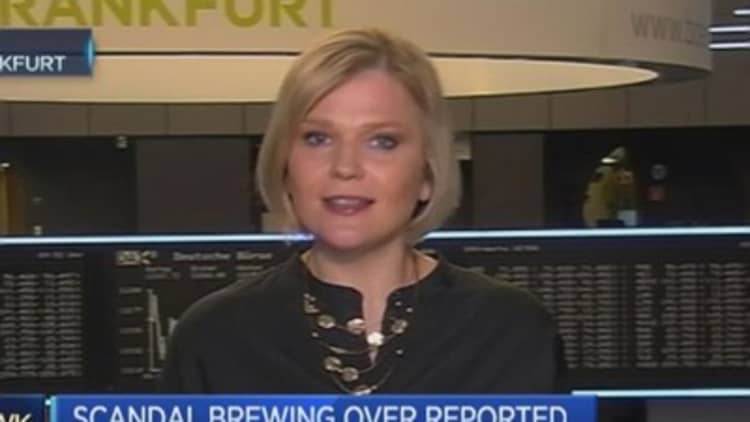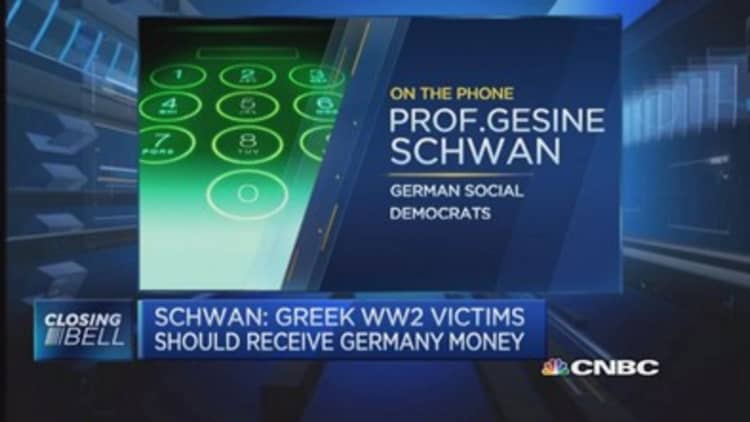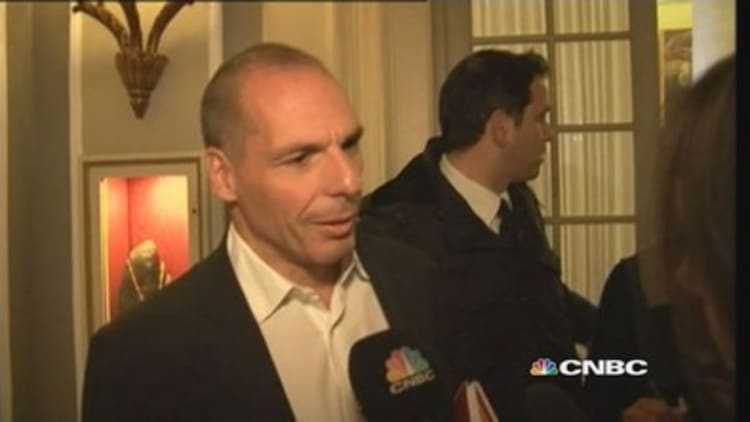



Greek Prime Minister, Alexis Tsipras, has been invited to Berlin by German Chancellor Angela Merkel for talks next week, as diplomatic relations between the two countries hits a low point.
Tensions were set on edge after a YouTube video from 2013 emerged at the weekend, purportedly showed Greek Finance Minister, Yanis Varoufakis, "giving the finger" to Germany.
The video features Varoufakis giving a lecture in Croatia in 2013. In it he says that Greece should have defaulted in 2010 "and stuck the finger to Germany," rather than accept financial aid. To date, Greece's has received two bailouts totaling 240 billion euros ($253 billion).
Read MoreGreek Finance Minister Varoufakis: I try not to be liability
Varoufakis appears to use his middle finger in a rude gesture when talking of Germany.
Responding to the video on Monday, Varoufakis told German magazine Der Spiegel that it was doctored and that he had "never given the finger, ever." He also took to Twitter to defend himself.
Alessandro Del Prete, who uploaded the video, also took to the social media site on Monday to deny altering the footage.
Greece's financial troubles are set to top the agenda at a European Union (EU) summit scheduled for Thursday and Friday this week.
On Tuesday, an unnamed Greek government official told Reuters that Prime Minister Alexis Tsipras had asked for a meeting with top European policymakers, including Merkel, European Central Bank chief Mario Draghi, French President Francois Hollande and European Commission President Jean-Claude Juncker on the sidelines of the summit.
Read MoreGreece lashes out as pressure to reform rises
Negotiations over the country's bailout program, funding needs and reform agenda could be tense as relations with Germany – its main creditor and driver of austerity measures in the euro zone -- seem to deteriorate more and more each day.
When Marxist-economist-turned-finance-minister Varoufakis and his German counterpart Wolfgang Schaeuble met soon after the new Greek government was elected, they could not even "agree to disagree" over the future of Greece's bailout and, since then, relations have soured further.
Schaeuble recently accused Varoufakis of being "insulting" during bailout negotiations - a charge which Greece then levelled back at Germany last week. Athens has since made a formal complaint against Schaeuble, although the German official dismissed the accusation as "nonsense," according to reports.
The war of words continued when Schaeuble said that Greece's new government had destroyed all the trust it had been rebuilt in the past, Reuters reported.
Greece was granted a four-month extension to its bailout, but if it is to receive more financial aid it must make dramatic and rapid reforms to its economy.
Anatoli Annenkov, senior European economist at Societe Generale, told CNBC Tuesday that as the bravado continued, progress on reforms was slow.
"There's lot of posturing going on and we need to get to real negotiations where there is something happening. I think the Germans are making it very clear where their position is," he told CNBC Europe's "Squawk Box."
"The Greeks are trying to introduce an anti-austerity debate and you can only do that if you can pay for it but Germany is certainly not going to pay for it."

Jim McCaughan, chief executive of Principal Global Investors, said there was still a risk of Greece ultimately having to leave the euro zone. Greece and Germany remain divided over how to reduce the former's debt pile, he told CNBC, which stood at 176 percent of GDP in 2014, according to the European Commission.
"They haven't solved the fundamental impasse which is that the Germans are saying the debts must be paid and the Greeks are saying, basically, we won't pay them," McCaughan said.
"Isn't that a fundamental problem that will almost certainly cause a break (from the euro zone)?"
Although concerns over a Greek exit from the euro zone, nicknamed a "Grexit," have been persistent since the new Greek government came to power, Annenkov was sanguine, saying: "I think there is strong underlying force in keeping Europe together."
Despite efforts to keep the single currency area intact, Greece is under pressure to reform and conform to its lenders' expectations. The EU's financial affairs chief, Pierre Moscovici, said Monday that reaching a political deal for Greece at the EU summit this week depended on whether the country's government committed to undertaking reforms, Reuters reported.
"I think any kind of deal...relies on strong commitments of the Greek government," the European Commissioner for Economic and Financial Affairs said at an event in Berlin.
"Commitments to reform, commitments to do what is in the common agreement that we signed on February 20," he added, referring to the date when Athens was granted an extension to its bailout.


